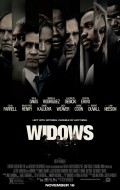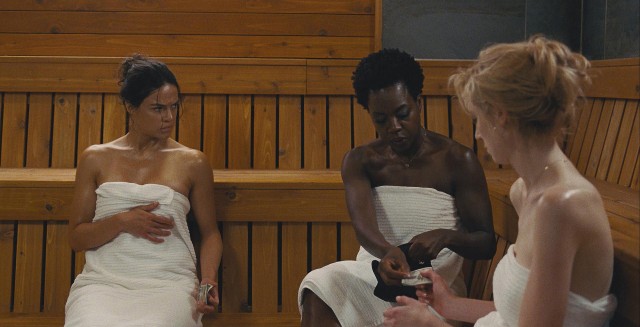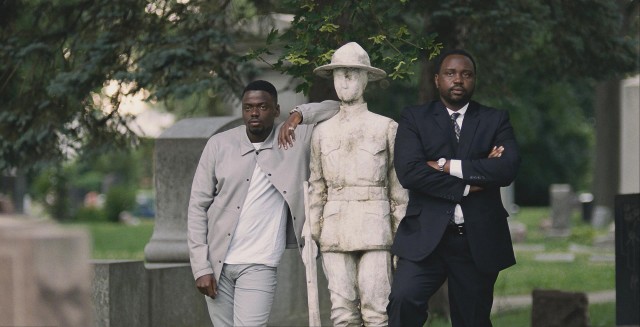Widows Movie Review
 |
Widows
Theatrical Release: November 16, 2018 / Running Time: 129 Minutes / Rating: R Director: Steve McQueen / Writers: Gillian Flynn, Steve McQueen (screenplay); Lynda La Plante (series) Cast: Viola Davis (Veronica Rawlins), Michelle Rodriguez (Linda Perelli), Elizabeth Debicki (Alice Gunner), Cynthia Erivo (Belle), Colin Farrell (Jack Mulligan), Brian Tyree Henry (Jamal Manning), Daniel Kaluuya (Jatemme Manning), Garret Dillahunt (Bash), Carrie Coon (Amanda), Jacki Weaver (Agnieska), Jon Bernthal (Florek), Manuel Garcia-Rulfo (Carlos), Robert Duvall (Tom Mulligan), Liam Neeson (Harry Rawlins), Lukas Haas (David) |
Gillian Flynn made an auspicious film debut in 2014 as the screenwriter of Gone Girl, adapting her novel to rave reviews and blockbuster returns rare for a grownup-oriented drama. A year later, French filmmaker Gilles Paquet-Brenner adapted another Flynn novel in Dark Places and the results weren't nearly as good. Especially for those who didn't watch "Sharp Objects", the HBO miniseries she executive produced and partially adapted from her novel, That question may remain somewhat of a mystery, but Flynn's talents are again on display in Widows, her second screenwriting credit. Once again, Flynn has teamed with a respected director, this time the UK's Steve McQueen (12 Years a Slave), with whom she shares screenplay credit. And once again, sharp direction is critical to the success of the final product.
Here, Flynn and McQueen adapt a two-season, 12-episode British crime drama series from the early 1980s. That show marked a game-changing reinvention for Lynda La Plante, a TV actress who stuck with writing moving forward and created the long-running procedurals "Prime Suspect" starring Helen Mirren, "Trial & Retribution", and "Above Suspicion" with Kelly Reilly and Ciarαn Hinds. Far from the well-known source that Flynn's much-discussed bestselling Gone Girl was, Widows is old and obscure enough for the author and McQueen to take what works, discard what doesn't, and put together something surprising and immersive. They succeed doing just that.
Set in present-day Chicago, Widows centers on a number of women who, as you might guess, have recently suffered the loss of their partners. Our protagonist is Veronica Rawlins (Viola Davis), a teacher's union delegate. Our introduction to Veronica comes as the happy wife of Harry Rawlins (Liam Neeson), who we learn is a successful robber. The one heist of his we get to see proves to be his last, however. He and his associates are ambushed by police and brought to a violent end.
Soon after, Veronica gets a visit from Jamal Manning (Brian Tyree Henry), a man running for alderman of a South Side ward. By now, we've already gotten acquainted with Jamal, his smarmy, privileged opponent Jack Mulligan (Colin Farrell), and Jamal's younger brother Jatemme (Get Out's Daniel Kaluuya), a ruthless right-hand enforcer. Jamal reveals to Veronica that Harry's final heist was of his campaign account and since the money is unrecovered, he's giving the grieving wife one month to cover her late husband's $2 million debt.
With the threat of danger high, Veronica arranges a meeting with the other wives and girlfriends left behind by that failed heist, Linda Perelli (Michelle Rodriguez) and Alice Gunner (Elizabeth Debicki). Each is facing desperation of their own: Linda's clothing shop is being closed for missed payments, while abuse victim Alice is being pressured by her mother (Jacki Weaver) to enter a financially lucrative arrangement with a businessman (Lukas Haas).
None of the women had any experience in their partners' dealings and none is qualified for what is to come. The plan is hatched to rob wealthy legacy candidate Mulligan's campaign headquarters. The women find their getaway driver in babysitter/beautician Belle (Cynthia Erivo).
McQueen and Flynn pack the proceedings tight. This film runs a little over two hours and unlike other entries to what can be considered the heist genre, it doesn't devote much of it to action. The heist itself and preparations for it claim a modest amount of screentime, allowing us to be immersed more in the characters and the intriguing web woven around them. You can certainly read into the premise as a timely tale of female empowerment. Whether or not that resonates for you, these wronged women will earn your empathy and your approval as they are determined to make things right as seemingly only they can.
Widows represents the first time I've fully appreciated McQueen's directing prowess. His 2013 Best Picture winner felt like a boring, safe choice in a year of more complex and rewarding gambles. The film he made before that, Shame, underwhelmed, the unconvincing story of Michael Fassbender as a sex addict overshadowing any arthouse aesthetic appeal. Widows definitely has potential to play corny, like a Mad Money or Ocean's Eight. But though witty in places, the film is never silly or trifling. It is dark and cynical but hopeful. There's an element of race. Jamal hopes to become the 18th ward's first black alderman. Mulligan looks good with his program of minority women business owners, while his career politician father (Robert Duvall) is openly racist behind closed doors. But the script and movie are too smart to paint with broad brushstrokes, giving us the grays that visually McQueen and cinematographer Sean Bobbitt largely eschew.
Davis is so consistently good that you hardly notice this must be her first movie as solo lead. She was certainly co-lead in Fences, which two years ago won her an Academy Award for Best Supporting Actress. No amount of category fraud could get her placed there this year, which makes acting nominations a bit more of a challenge in a year with some strong lead actress performances, most of them due to earn the same drama classification at the Golden Globes. Kaluuya, nominated last year for the Lead Actor Oscar, might be a contender in Supporting Actor if his menacing character didn't disappear for large stretches of the film. That leaves the real standout of the movie, the towering, vulnerable Debicki, as the cast member most eligible for accolades. Having put in five years of work in a variety of films starting with The Great Gatsby, the Australian actress demonstrates she is capable of more, should Hollywood have enough strong female roles to go around.
Widows is probably more of commercial movie than an awards one. Gone Girl seemed like both, but only wound up with a Best Actress nomination at the Oscars. While Widows is unlikely to do as much business as that mystery, it is hopefully too good to struggle to find an audience, even during this competitive month when theater real estate is at a premium.
|
Related Reviews:
DVDizzy.com | DVD and Blu-ray Reviews | New and Upcoming DVD & Blu-ray Schedule | Upcoming Cover Art | Search This Site
DVDizzy.com Top Stories:
Now in Theaters: The Front Runner A Private War Can You Ever Forgive Me? First Man Green Book The Old Man & the Gun
Written by Gillian Flynn: Gone Girl Dark Places (novel only) | Written by Lynda La Plante: Above Suspicion: The Complete Collection
Viola Davis: Fences Prisoners The Help Doubt Beautiful Creatures
Elizabeth Debicki: The Great Gatsby The Man from U.N.C.L.E. Everest | Daniel Kaluuya: Get Out Black Panther
Colin Farrell: The Killing of a Sacred Deer | Robert Duvall: The Judge
Text copyright 2018 DVDizzy.com. Images copyright 2018 Twentieth Century Fox, Regency Enterprises, Film4, See-Saw Films, and Lammas Park Productions.
Unauthorized reproduction prohibited.

